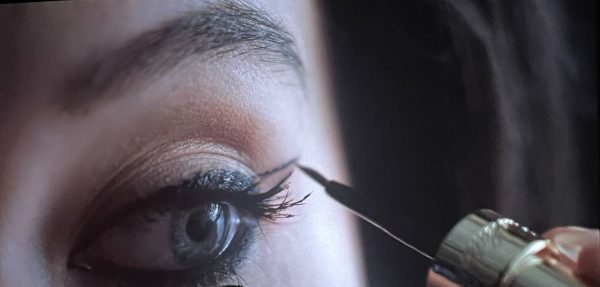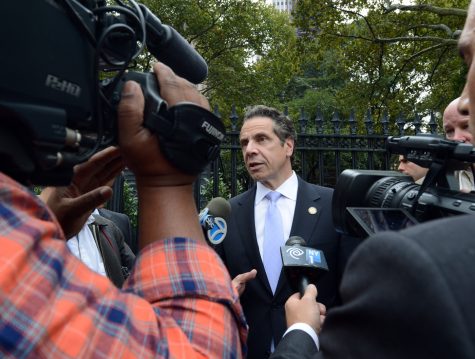Why “Don’t Worry Darling” Makes Everyone Worry
Don’t Worry Darling (2022), directed by Olivia Wilde, was among one of the most highly anticipated film releases of 2022.
The movie consists of a stellar cast including Olivia Wilde, Florence Pugh, and Harry Styles. All of whom did an exceptional job in portraying their characters.
The accredited costume designer, Arianne Phillips of the film, who also styled Once Upon a Time in Hollywood, allowed these modern actors to look the part. Phillips styled the men in tailored suits and the women in ribbons and extravagant dresses.
This styling was none other than accurate according to the time. Alice’s outfits in Victory showcase her bubbly and carefree nature, yet in her waking life, her dull blue scrubs show Alice’s devotion to her career, which she is stripped of in Victory.
Don’t Worry Darling takes place in the Californian suburban town of Victory, where the men drive fast cars and the women shop until they drop.
Upon some brief scenes of water droplets to tell viewers this is an optical illusion, we meet our main protagonist, Alice Chambers (Florence Pugh), who is married to the alpha male, Jack Chambers (Harry Styles). Despite their perfect home, unlimited credit card balances, and fiery love life, Alice takes note of the cynical undertakings her beloved town has within its community.
It isn’t until Alice sees (or believes she sees) a plane crash that she immediately stops the trolley and asks to be let off, which was her first mistake. From there, she stumbles across headquarters, touches a glass door, and begins to remember pieces of her waking life throughout the rest of the film. This part left viewers (myself included) dumbfounded since there was no explanation of what the headquarters’ purpose was until the final moments of the film.
Alice finally starts questioning everything. She reveals she broke the rule Victory’s moral foundation is based on (headquarters being off limits) to her close friend Bunny (Olivia Wilde) while they were at a gala. To Alice’s surprise, Bunny scolds Alice after she breaks “the one rule they ask us to respect.” Bunny’s outrage is contradictory since she is fully aware of the simulation. Bunny should have told her friend the truth instead of putting on a facade.
Alice, fueled by her close friend and husband’s treachery, plans a dinner to uncover Frank’s ulterior motive—her second mistake. To her convenience, Alice is handed information on a silver platter that will further her plan. Upon light dinner conversation, she notices all her friends honeymooned at the same location.
Alice starts questioning this topic and attempts to humiliate Frank, but is ultimately scolded by Frank’s wife, Shelley (Gemma Chan). Alice somehow “convinces” Jack to escape with her, but instead, Jack has her taken away by red guards and given electroshock therapy, which wipes her memory.
During Alice’s treatment, we see how her life was before she arrived in Victory. In a solemn scene, it’s revealed Alice was a successful surgeon, while Jack was a stay-at-home boyfriend who frequently listens to an incel podcast, hosted by none other than Frank.
After a 12-hour shift and returning to a house that has no running water (shouldn’t surgeons afford to have hot water?), Alice is exhausted and wants to lie down when Jack asks to dance with her.
If Jack was on his feet for 12 hours, he would have some empathy, but instead, he singles Alice out and claims she doesn’t make time for him, reeking of insecurity. From this instance alone, viewers can tell Jack is the co-dependent person in the relationship both financially and emotionally, the mere opposite of the simulation.
Cut to the most chilling scene in the movie, when Jack knocks Alice unconscious and puts round silver sci-fi-esque contacts in her eyes, which presumably enter her and himself in the simulation.
Jack ensures Alice never exits the simulation by tending to her lifeless body (which he couldn’t control in their waking life until now), and also pays for their Victory Project subscription, which is why the men drive off every morning.
They go to headquarters, where the wives are not allowed, to re-enter their waking life and attend to their real jobs to stay in The Victory Project. This makes us wonder if Jack is robbing Alice since he was unemployed before entering the simulation. Who is paying for it?
When Alice returns from her “therapy,” her memory is wiped (or so we think). While preparing dinner, she experiences a more extreme form of deja vu. She realizes exactly what is going on and kills Jack, which admittedly is extremely satisfying since Jack is almost as heinous as Frank. Bunny arrives from next door and confesses she too has known the truth all along (it’s about time). She urges Alice to go to headquarters, and during a high-speed chase, she does. Alice touches the glass once again and frees herself from the simulation, a very satisfying yet puzzling scene since the credits roll immediately after.
Don’t Worry Darling was more than a sci-fi movie, it gave minimal context into what The Victory Project was, viewers needed to take note of the subliminal hints (i.e. Frank’s wording in his speech) to piece together the message Olivia Wilde was trying to convey in this film.
In terms of symbolism, I interpreted that Frank and Jack represented the patriarchy, since they are threatened by the potential of a woman. This could also be why Frank made the simulation take place in the 1950s. A time when only the voices of men were heard and women had no choice but to listen.
Olivia Wilde seized the opportunity to give us the resilient and inquisitive Alice. Who is initially doubted, but is ultimately right. Frank actively seeks out insecure men, like Jack, with his incel podcast and urges them to find their inner “greatness” by making their spouses apologize for their success.
This film was needed to show women that despite the odds we have against us our voices are needed to address the shortcomings of society that men don’t necessarily experience.
Admittedly, Harry Styles was easy on the eyes, which made the headache I got from the optics of this movie bearable. Viewers (myself included) still wonder that if Alice loved Jack despite his status why couldn’t he do the same?
Rating: 6/10

Alexandra Cortese is a junior at John Jay College. She is majoring in law & society and is minoring in English literature.
Alexandra has previously...
















